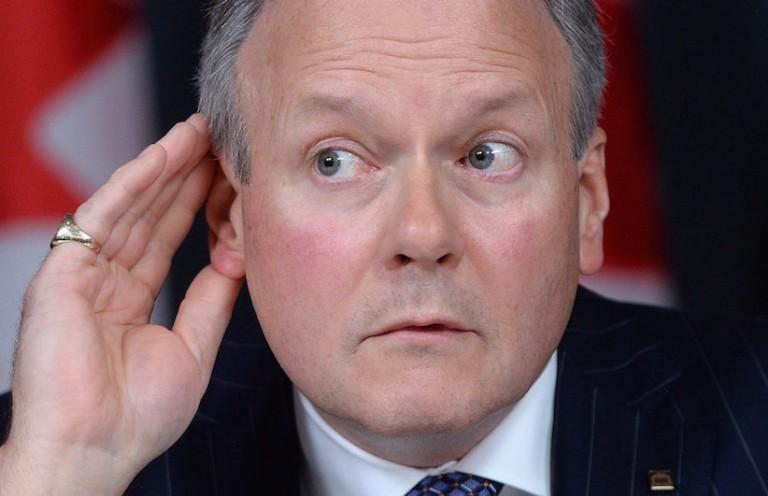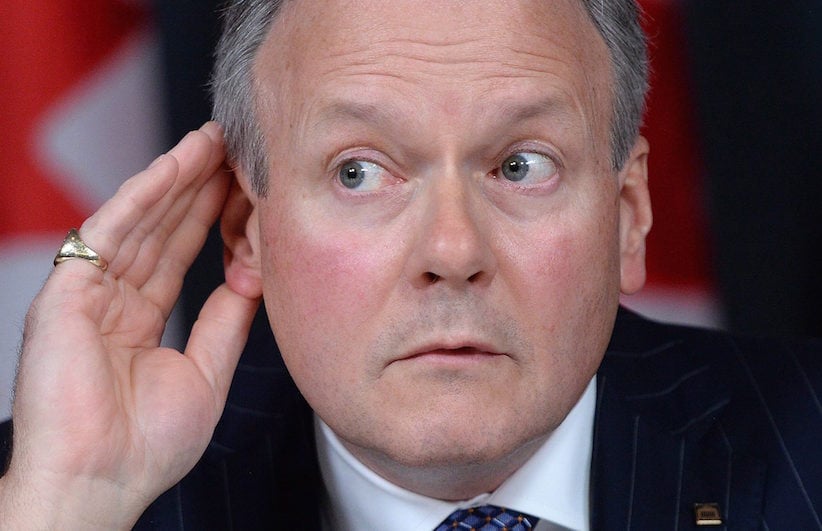Why the Trudeau PMO needs to butt out of the Bank of Canada’s business
Officials in the PMO reportedly aren’t happy that interest rates are rising. Bill Morneau needs to forcefully signal his confidence in the Bank of Canada, now.

Bank of Canada Governor Stephen Poloz listens to a question as he holds a new conference at the National Press Theatre in Ottawa on Wednesday, April 13, 2016. THE CANADIAN PRESS/Sean Kilpatrick
Share

This just in: some of the smart boys and girls who surround Prime Minister Justin Trudeau are unhappy with the Bank of Canada’s decision to increase interest rates earlier this month.
“Officials” are worried Governor Stephen Poloz moved too soon, and could inadvertently trigger a downturn, Bloomberg News reported on Thursday. Gone, apparently, are the days when the government sought to inspire confidence in the economy. If households are equally panicked about the benchmark interest rate climbing to—gasp!—one per cent in the near future, we’re in a lot of trouble.
The Prime Minister’s Office and the central bank declined to comment, and Finance Minister Bill Morneau said in a statement that he doesn’t comment on the central bank’s independent policy decisions. Don’t be deterred by those customary deflections. I worked at Bloomberg for seven years. Its sourcing standards are among the most rigorous in the business. This is real news.
So what to make of this unusual violation of the separation of politics and central bank?
RELATED: What higher interest rates mean for real estate, debt and the economy
Given the relative youth of the Trudeau crowd, and their evident enthusiasm for the sexier aspects of running a G20 country, this chatter may simply reflect inexperience. And if that’s all it is, then someone ought to brief them on why their predecessors kept their thoughts about monetary policy to themselves.
Controlling inflation is as much about confidence as it is about moving interest rates up and down. If the public trusts the central bank will keep inflation at two per cent, economic actors will make decisions that have the divine effect of helping policy makers keep inflation at two per cent.
But when politicos start whispering about where they think interest rates should be set, they undermine the central bank’s credibility. You don’t even have to close your eyes to imagine the snark that will accompany the Bank of Canada’s next interest-rate announcement in September. Are rates going up? Ask Gerald Butts. Doubt spreads. Before you know it, traders are adding the prime minister’s Twitter feed to the indicators they watch to determine where interest rates are headed. Poloz has a free hand, but he’s human; if you were facing a decision that could go either way, and you knew the person who is ultimately your boss favours one direction over the other, what would you do?
Fortunately, we shouldn’t have to deal with this intrigue for very long. Morneau can chase away all doubt with a statement of confidence in the Bank of Canada, although he will have to do better than a boilerplate statement. If he doesn’t do this, then you have a tell: the Trudeau government really is displeased with the conduct of monetary policy and they want us—and the central bank—to know it.
The more troubling aspect of the Bloomberg story might be how little confidence the federal government appears to have in Canada’s red-hot economy. There are excellent reasons to be wary of Canada’s medium-term prospects. Here are three off the top of my head: Record levels of household debt threaten future spending, too many of our companies need a weaker currency to be competitive, and international energy companies are giving up on Canada as a place to invest.
I could go on, but if I did, I would be succumbing to the voice in every journalist’s head that urges him or her to emphasize the negative. The threats facing Canada’s economy are real, but so far theoretical: the things we can actually see suggest economic growth is as strong as it’s been since the commodity boom that followed the Great Recession. You’ve no doubt heard that Canada is the fastest growing economy in the Group of Seven. That’s real news, too. Yet the Prime Minister’s Office appears to think an economy that has been growing at an annual rate of around three per cent for nearly a year is too weak to absorb interest rates that still are near record lows.
The final thing to say is that those “officials” should pay closer attention to what the Bank of Canada actually says, and less to the over-interpretation of those words by the currency traders who have driven the Canadian dollar to 80 U.S. cents in recent days, a 10-percent increase since May.
Poloz and his lieutenants on the Governing Council opted to use this window of faster growth to raise interest rates for two reasons: first, their models tell them inflation is coming; and second, common sense and considerable academic study inform them that interest rates can’t stay near zero forever.
But many observers of the Canadian economy appear to have missed a crucial element of Poloz’s current thinking. He’s encouraged by signs that businesses are gearing up to spend more money, and that wages gains are stronger. Poloz is open to the possibility that these things will add to the country’s potential to grow without stoking excessive inflation. That would allow the central bank to take a break from raising interest rates because it could worry less about missing its inflation target. Poloz mentioned the U.S., where the Federal Reserve has been gradually raising interest rates, even though the unemployment rate and other indicators suggest the economy is red-lining. “There’s been a process of very careful, graduated movements while the labour market has continued to outperform people’s expectations,” Poloz said. “I think underneath that is a story similar to this,” he added, referring to what he sees on his own patch.
MORE: Why didn’t markets see the Bank of Canada interest rate hike coming?
So the Trudeau crowd needn’t worry about the Bank of Canada killing the boss’s recovery. In fact, the bigger threat to the rebound could be the slow implementation of Trudeau’s and Morneau’s infrastructure program. Those hundreds of millions of dollars looked good on paper, but all that money has had a limited effect on gross domestic product so far.
The central bank is puzzled by this. It keeps revising its forecasts to adjust for anticipated public spending that doesn’t happen. But you won’t find officials there talking about any issues they have with the infrastructure program with reporters, on or off the record. Trudeau’s politicos might want to consider extending the Bank of Canada a similar courtesy.
MORE ABOUT BANK OF CANADA:
- What slow inflation could mean for interest rates
- The interest rate hike is going to leave its mark on Canadian exporters
- Why banks are so slow to lower lending rates, but so quick to hike them
- Interest rate hike: Why Stephen Poloz still sounds anxious
- Why the Bank of Canada hiked interest rates
- Here’s how fast Canada’s economy is now growing
- What higher interest rates mean for real estate, debt and the economy
- The hype about a Donald Trump bump for the U.S. economy is over